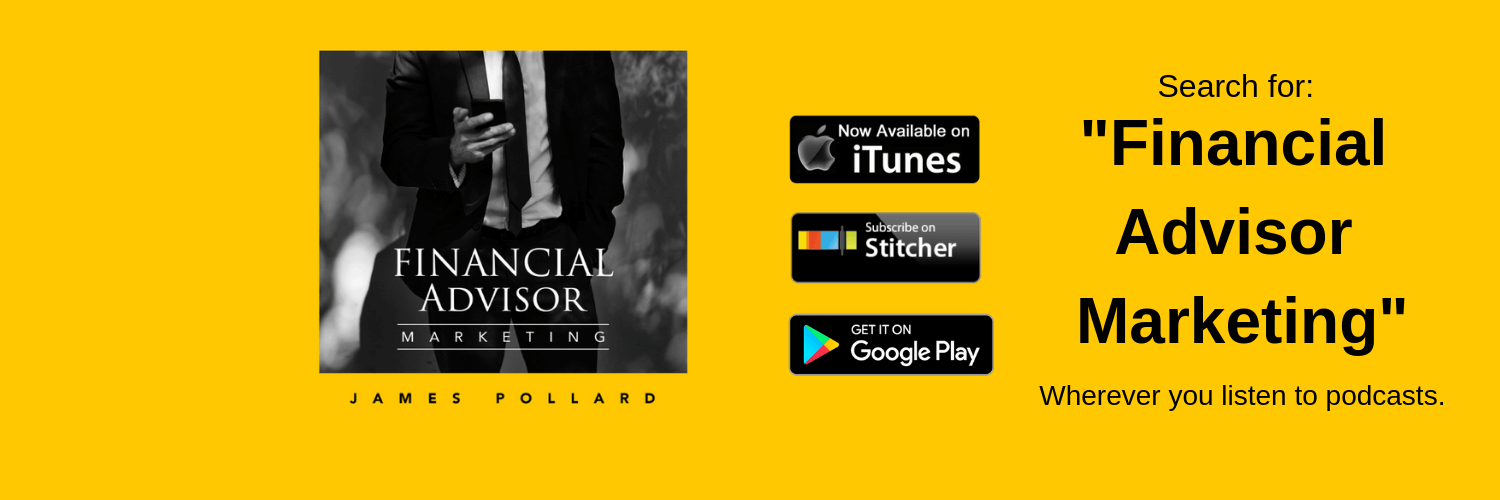How to Become a Financial Advisor In 5 (Not So Easy) StepsThere’s never been a better time to become a financial advisor.
With an impending financial advisor exodus coming over the next decade, there will be a wide open gap in the industry for newcomers to fill in. In such a competitive industry, this provides an invaluable advantage for all newcomers. This is a time for new advisors to come in and make their value propositions so strong that clients view themselves lucky to have the relationship. Because the opportunity of a lifetime is coming... and it will happen. The financial advisors who are poised to take advantage of it will skyrocket past everyone else. ALSO READ: The Secret Behind Awesome Financial Advisor Value Propositions And although there has been a rise in the use of ‘robo-advisors’, these won’t be replacing human advisors anytime soon. In fact, most Americans will still choose a human advisor over advanced robo-advisors. While some people are comfortable with a mix of the two, only a small percentage of Americans feel comfortable getting advice for a financial plan with more automation than human assistance. This indication that people still crave human financial advisors is a major advantage to newcomers to the industry - it’s a surefire sign that the profession is here to stay. Should You Become A Financial Advisor?
These traits are key to a financial advisor’s success - if you don’t recognize yourself, definitely spend time improving on these before you enter the field:
Yes, that’s a lot to work on. However, I mention these with your best interest at heart. The truth is, most financial advisors fail. Here’s the deal - a career in financial advising provides little to no stability. Your income will be based solely on your commissions, which is a double-edged sword. If you have a high pain tolerance and put in the grueling work, you can get so much out of this career. Your growth has virtually no ceiling. And to get that commission, you’ll have to play the numbers game. Not every call you make will result in a meeting, and you won’t close a deal on all the meetings you book. This means you’ll be hustling for a long time to build your initial client base. As a result, over 90% of financial advisors fail. This is why developing the right traits and a thick skin is key to succeeding in this career. If I haven’t put you off too much from this profession yet - and you’re willing to put in the sweat and tears necessary to succeed - I’ll be covering everything you need to know to become a financial advisor. There are multiple paths to starting this career, but I’ll focus on the generally accepted path. How Long Does It Take To Become A Financial Advisor?
The exact time it will take you to become a financial advisor will depend on a few factors. For instance, if you already have a bachelor’s degree, you’ll save yourself a good four years of studies before hopping on to an MBA if that is your goal.
Most people complete their MBA in 18 months, but this can change depending on your current life structure. For instance, if you currently have a demanding full time job that you need to keep to pay off your student loans (or support your family), it may take you longer than average. The Traditional Path To Becoming A Financial Advisor
Although getting a college degree isn’t a strict obligation to become a financial advisor, you’ll most likely need to start your career by working with a firm. Most firms won’t hire you if you don’t have a relevant degree, so let’s get into it...
1. Get Your Bachelor's DegreeThis is the very first step to get your foot in the door. Any of the following majors are relevant for financial advisors:
On top of your major, you should consider taking elective classes to get as much knowledge as you can while you’re in college. A degree might open the door, but don’t make the mistake of breezing through your studies without actually retaining what you learn. For instance, taking classes in financial planning, estate management, risk control, or investing could give you an edge to get started. Additionally, you might want to consider taking a minor in marketing - this will give you invaluable insight on how to sell yourself once you enter the field. You can choose any degree to take a generalist approach, or you could go the specialist route as well. For example, if you want to specialize in insurance or retirement, you could choose your courses to learn everything you can about your specialty. However, if you plan on becoming a certified financial planner, your choice of major will be more restricted. The CFP Board of Standards requires you to take specific programs in financial planning - or an accepted equivalent. So if you intend on doing this, be sure to check the CFP’s website to check which college programs qualify before applying for your major. If you want to study online, you can! Several colleges and universities offer relevant majors - and CFP approved programs - on an online basis. So, if your schedule or your location is an issue, don’t let this stop you. 2. Become An Intern
Getting a job without experience is difficult in any field, but it’s especially true for financial advisors. As your studies for your bachelor’s degree come to an end, consider applying for an internship before launching yourself with full force in your career.
This will be an opportunity for you to take everything you’ve learned during your major and put it into practice under the guidance of more experienced financial advisors. When looking for an internship, you want to find an opportunity that will allow you to continue learning. Many internships are unpaid, but in exchange, the firm provides you with invaluable insight and mentorship. If this isn’t the case, you’re in the wrong internship. 3. Get Certified
So, you have spent years learning everything you need to know, and you’ve just finished putting these newly acquired skills to use in an internship. Now is the time to get certified.
The exact certifications and licenses you’ll need depend on the type of services you want to offer. Most certifications will require more coursework and an exam. Additionally, you’ll be required to continue your education throughout your career to keep your certification. These licenses are often given by the Financial Industry Regulatory Authority (FINRA). For example, if you want to sell insurance premiums, mutual funds, and variable annuities, you’ll need to pass the Series 6 exam. But if you want to sell stocks and bonds, you’ll need to get the Series 7 license. When taking a FINRA exam, you can expect to answer multiple choice questions. Their exams range from 75 minutes to three hours. On top of FINRA licenses, some services will also require you to get state certified. Selling insurance products is such an example. 4. Find An Entry Level Job
For your first job, you’ll want to find an opportunity that teaches you what you need to know about growing your career, like building your network and winning at cold calls. For this type of entry-level job, you’ll likely find success at a large broker firm.
However, this largely depends on your goals - for instance, if you are aiming to become a financial planner, you may want to look for opportunities in small or mid-sized firms. But getting that first job for the sake of a job isn’t the end goal, here. To place the odds in your favor, you want to join a firm that will provide you with guidance and ongoing training. Additionally, you will need to find a mentor within that firm - someone with decades of experience to show you the ins and outs of the industry. You can always reach out to other people in your network if you cannot find a mentor within your firm. The important point to note is that you should pick your mentor carefully if you want to be become a part of the 10% of financial advisors who succeed. ALSO READ: 10 Things I Wish All Entry Level Financial Advisors Knew 5. Pursue Your Education
As a financial advisor, you are never done learning. It’s a good idea to invest in continuing education or get your MBA, even once you’ve gotten your first job in the industry.
This ensures that you’ll keep your edge and won't become complacent when it comes to staying up to date. This also includes continuing education. For example, if you decide to become a Certified Financial Planner® then you must complete at least 30 hours of continuing education every two years. However, you shouldn't view education as a necessary evil. Instead, it should be something you embrace. I've consistently found that the financial advisors who continually invest in themselves get the best results. And even though I offer products ranging from a monthly paper-and-ink newsletter to a course with 11 hours of video content, gaining additional knowledge doesn't require investing cash (although investing cash does make the process faster). For example, you can subscribe to my "Financial Advisor Marketing" podcast, where new episodes go live every Monday. :-) Becoming A Financial Advisor Right Out Of College
If you’re a young college graduate with no previous career, you may run into age bias when trying to find your first real job as a financial advisor.
However, there are ways to counter this - after all, you’ve gotten your education, completed your certifications, and gone through the internship process. You are just as qualified as an older graduate that is making a career change. It’s your job to show your prospects that you are just as qualified. The first thing you should focus on is making a good first impression on prospective clients. Present yourself as a business professional and act the part. If you act with confidence and present the image that clients expect from a veteran financial advisor, this will go a long way to gaining their trust despite your young age. Dress to impress. Believe in yourself. If you have doubts about your abilities, prospects will smell it from a mile away. How can they be confident in your abilities if you haven’t developed that confidence in the first place? Becoming A Financial Advisor As A Career-Changer
On the other end of the spectrum from fresh college graduates are the people who are older and want to make a career change.
If this is your situation, you have an advantage over those who don’t have a previous career:
Let’s take the example of an engineer making the switch to a career in financial advising. Because you know the ins and outs of engineering, you can easily relate to other engineers - you know what their lifestyle is like, how much money they make, how they spend their money, etc. The more dialed in you are, the more likely prospects in this niche will relate to you and trust you. Not only that, but you’ll have an existing network from your previous career. You can tap into this network when you begin to prospect from work. People who already like and trust you will be much more likely to give you their business than completely cold strangers. Another example involves former military. Tons of former military members transition to become financial advisors and, in my experience, they tend to do better than average. One of my Inner Circle members followed this path and because he's a veteran himself (a Marine), he's passionate about helping veterans plan for retirement, protect their families, and gain peace of mind. Which brings me to my point... This is the PERFECT niche for him because he loves military veterans and can relate to them on a deeper level than some generalist financial advisor. The best niche for you is the one that works for YOU. Because if you can pick a niche and drill deep into that niche, you can instantly separate yourself from the competition and get more clients. ALSO READ: 5 Best Niches for Financial Advisors Financial Advisor Career Outlook
According to the Bureau of Labor Statistics, the number of jobs in financial advising is expected to grow 15% from 2016 to 2026. This translates to an extra 40,400 jobs during the decade and is much faster than the average job outlook in the US.
But that’s not all. Not only are there more job opportunities being created, but veteran advisors are leaving the industry at a crazy rate. This means demand is growing, but supply is shrinking. In fact, the job of financial advisor is one of the most in-demand jobs right now, but also one of the toughest positions to fill. For those who are willing to put in the effort and go through the path I’ve outlined, career outlooks are some of the best you’ll ever see. |



